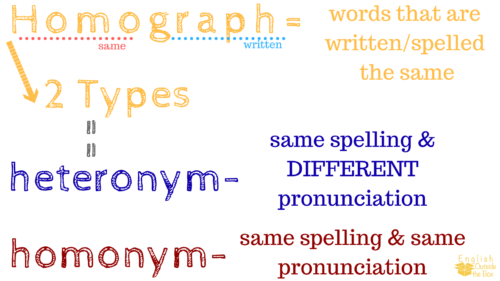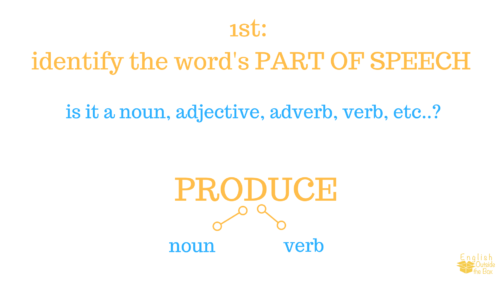
American English Pronunciation: Heteronyms
I was inspired for this post today after realizing the difficulty that many students have with the pronunciation of heteronyms (words that are spelled the same but pronounced differently). In the past week, I had 3, yes 3, conversations with different students about this very topic. The idea that words can look the same, but be pronounced differently really confused my learners, so I wanted to create material for them, and you, about the correct American English pronunciation. I have written on this topic before, so some of the content today comes from a past post; however, I’ve enriched it (*made it better*) by including a 5 Minute English video lesson.
We’ll begin today’s lesson with the video. I recommend watching the video and taking notes to improve your listening comprehension skills. You can then add to these notes by going through this blog post below and checking the information. This post will include a few more examples and practice exercises at the end. When you’re finished, don’t forget to practice! You can always do that by commenting below this post, the YouTube video or on social media.
Let’s do this!
Important Vocabulary
Homograph: a word that is spelled (written) the same as another word (homo: same, graph: written). However, these words have different meanings. Review this type below:
- Heteronym (also known as a heterophone): a word that has the same spelling as another word, but a different meaning and different pronunciation (hetero: different, phone: sound) Some common heterophone examples are: insult, produce, etc…
- Homonym: a word that has the same spelling as another word, but the same pronunciation (it has different meanings). Some examples: bear, bark, foot, etc..
Pronunciation Rules
So, how will you know the difference between the two? How are you supposed to know how to pronounce these words? Remember, as you just learned, there is a [pretty] easy rule to follow when looking at heteronyms that are 2-syllable nouns and verbs. (*Please remember, like with most rules in English there are exceptions.)
What’s a syllable? A small part (sound) of a word, separated by the vowels and surrounding consonants. For nouns, the accent and stress is going to go on the first syllable of heteronyms. If it is a verb, the accent is on the second syllable of the word.
The examples you saw above and heard in the video are examples of these 2-syllable nouns and verbs. So let’s break them down here, look at some sentences, and give additional examples.
INSULT
The INsult John heard about his boss was really offensive. (noun)
James inSULted his boss when he called him cheap. (verb)
As you practice, and read these sentences, can you hear the difference? In the first example the first syllable “in” should be higher, longer, and a bit louder. When it’s a verb, the second syllable “SUL” receives the stress.
RECORD
In the example, “I can keep a record of my quiz scores,” record is a noun. The accent would go on the first syllable. REcord. I can keep a REcord..
In the example, “I can record the scores in a notebook,” record is a verb. The accent would go on the second syllable. reCORD. I can reCORD….
This word can also be an adjective, and the adjective will found the pattern of the noun.
Using different accents and stress will help indicate what part of speech this word is (part of speech =, noun, verb, adjective, adverb, etc..).
Time for Practice
Here are some additional words and sentences to practice the sounds. To check if you’re correct, the highlighted accents are shown below. Try and complete this exercise to “test” yourself before you look at the answers. Good Luck!
1. DESERT
James was worried that his friend would desert him in the desert.
2. OBJECT
“I object!” yelled the lawyer, that object should not be here.
3. SUBJECT
The subject in the experiment was subjected to a lot of pain.
4. CONFLICT
The conflict with my friend conflicted with our relationship..
5. CONTRACT
My muscle was contracting as I read the contract
Remember the answers are below
To practice on your own, the best way is looking for lists of heteronyms, and try to create sentences using the different words to practice on your own. The more you practice, and the more comfortable you get with identifying the parts of speech of a word, the easier and more natural you will sound in speech. Make a list of at least 5 new heteronym examples and create some sentences.
Feel free to write your examples in the comments below!
Are you ready for the answers to your sentence stress practice?
Are you sure you practiced on your own?
Okay, here are the highlighted answers showing you how you should have read the sentences.
1. James was worried that his friend would deSERT him in the DEsert.
2. “I obJECT!” yelled the lawyer, that OBject should not be here.
3. The SUBject in the experiment was subJECTed to a lot of pain.
4. The CONflict with my friend conFLICTed with our relationship.
5. My muscle was conTRACting as I read the CONtract.
How did you do? Do you have any questions? Let me know in the comment section, and I would LOVE to see your examples below, too!
As always…
Happy Studying! ♥
The Conversation Club will provide you with 6 group conversation calls to practice with a real teacher and a group message community to connect with other members.
You will also get weekly English lessons to help your vocabulary, listening, reading, pronunciation, and more!
Try the Club for 1 week, free! Join the 1-week free trial here.



The article and the videos are very useful to learn pronociations. Thanks.
I am so happy to help you out! Have you watched/read the other lessons?